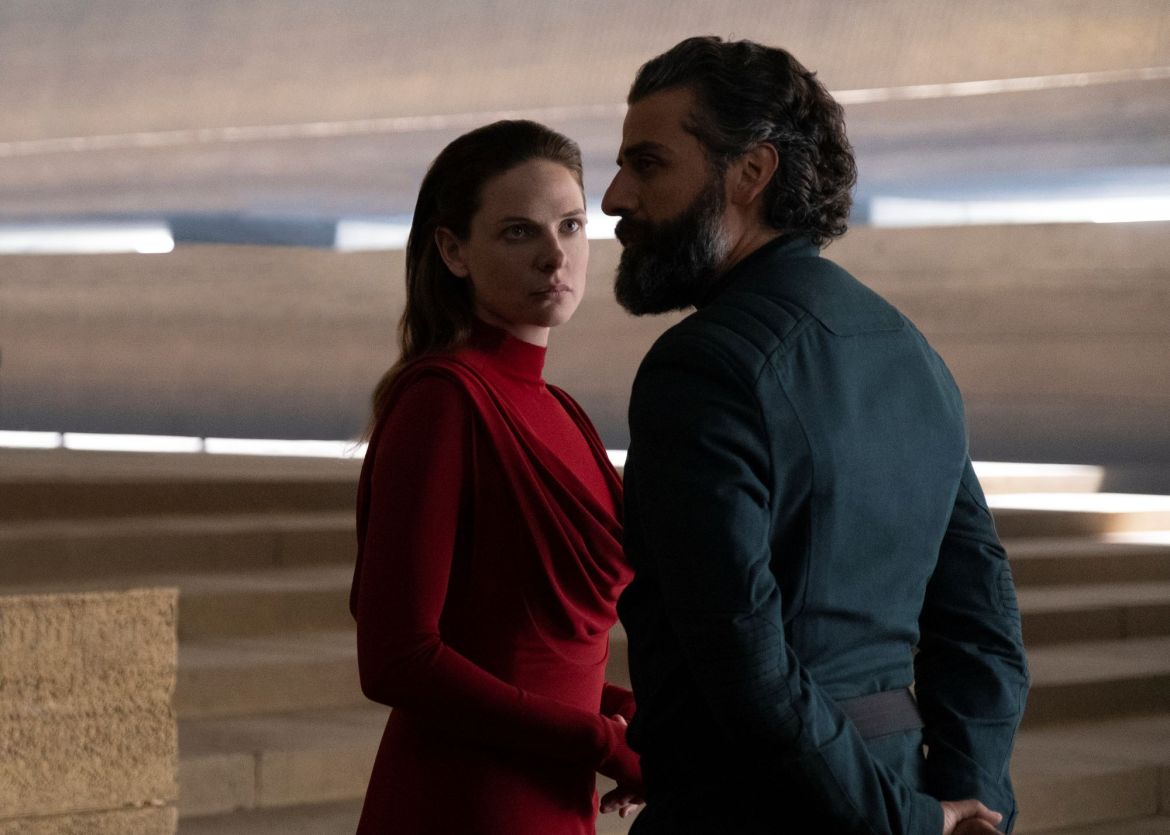
Denis Villeneuve’s Dune is the latest and best effort to turn the political sci fi epic into a worthy big screen experience. Frank Herbert’s groundbreaking 1965 novel has proven to be a particularly challenging story to adapt, as many filmmakers — most notably Alejandro Jodorowsky and David Lynch — can attest. Villeneuve’s achievement may not fully realize the big ideas of the novel, but the resulting film is something that is somehow greater than the sum of its parts.
What makes Dune so particularly difficult to translate from page to screen is the odd combination of complex political intrigue, melodramatic earnestness, and a silliness that includes a collection of names that ranges from weird to weirdly normal (Bene Gesserit … Kwisatz Haderach … Jessica?). How does one embrace the strangeness of the story’s elements while also giving appropriate weight to its themes?
The basic premise of Dune (Part One, as the title card promises) follows a Duke, Leto Atreides (Oscar Isaac) who has just been appointed by the unseen Emperor to uproot his family from their comfortably temperate planet of Caladan and travel to Arrakis to oversee the harvesting and production of spice, the galaxy’s most valuable and important commodity. Together with his son Paul (Timothée Chalamet), his concubine Jessica (Rebecca Ferguson), and a crew of loyal military leaders including Duncan Idaho (Jason Momoa) and Gurney Halleck (Josh Brolin), they soon set off for the impossibly hot and arid desert planet that is not only environmentally unfriendly, but politically hostile as well.
There are a lot of people to meet and a lot of history to understand before the story can really get underway and Villeneuve’s crew manage to do so without making it feel tedious. This is a 2.5 hour movie, though, and asking the audience to commit to so much world-building without the guarantee of a Part 2 is risky and perhaps a little unfair. But there is beauty in the austere splendor of House Atreides and the introduction of certain characters is at least interesting. Paul’s friendship with Duncan is sweet and the power dynamics balance themselves out between the authority wielded by the Duke’s son and the physical strength of the sword master who is his mentor. Their bond mirrors the one between his father and Gurney, the weapons master.

Still, one can’t help but observe the definite imbalance of male and female characters, which might not have been as noticeable if director Denis Villeneuve hadn’t been on a year-long press tour praising himself for ordering his writers to focus on the women in the story. The Lady Jessica worries and frets over Paul and his possible future, but with the exception of a few key moments, Jessica’s power as a member of the Bene Gesserit is largely diminished by her anxieties over current events. Chani (Zendaya) may not be a manic pixie, but she is the literal dream girl who Paul does not know but sees in his sleep. She will feature prominently in the next film, but for now we see little more than whispers of Chani, a gauzy promise of…something. Save for one important and slightly frightening scene involving Paul and the Bene Gesserit’s terrifying Reverend Mother (Charlotte Rampling), the only other woman of prominence in Part 1 is Dr. Liet Kynes (Sharon Duncan-Brewster) in a role that has been gender-swapped from the book and thereby adopts a much different purpose here.
Dune is very clearly intended as the launching point for a much larger story, and as such it spends most of its time setting the stage. We become well acquainted with the Duke, as well as House Atreides’ rivals, the Harkonnens, who did not take well to the news that they were to be ousted from Arrakis after decades in command there. Following orders from the Baron (Stellan Skarsgård), the Harkonnens set out to put a stop to the takeover. Most of all, we get to know Paul, the reluctant heir to his father’s title, and the possible fulfillment of a millenia-old prophecy.
What we do not get is anything that amounts to conclusion of any kind, nor any particularly deep connection to anyone involved. There is a persistent aloofness to Villeneuve’s films that tends to render his central characters emotionally unavailable and Dune is no exception.
And yet, there is much to admire about the artistry and craft of it. With its level of majesty and grandeur, Dune is a film that burrows into your senses much more than into your thoughts. As a collection of sensations and feelings, it is effective and epic, the type of rare cinematic experience we crave.
Dune is now playing in theaters and on HBO Max.

